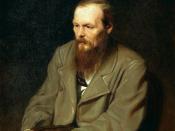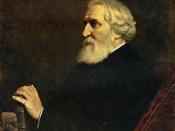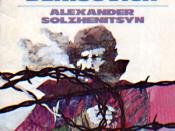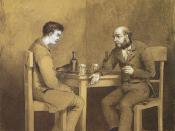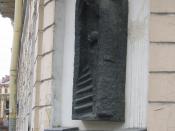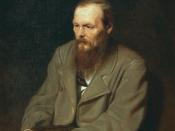Throughout Russian history, philosophy has been important to the people of Russia, a point which shows up in their literature. Early Russian Literature was usually infused with the philosophy of the time but the oppressiveness of Stalinist Russia took the philosophy out of literature this conclusion is exemplified by two of the most important books from czarist Russia, Dostoevsky's Crime and Punishment and Turgenev's Fathers and Sons as compared to the most influential book from Stalinist Russia, Solzhenitsyn's One Day in the Life of Ivan Denisovich. This comes out through the ideas in the book as well as the moral dilemmas that are imposed on the characters.
Literature from czarist Russia incorporated many philosophical ideas. One of these ideas is the negative hero as described by Jean Sisk, "the Russian negative heroes were men who, faced with the need to make a decision or choice, reacted mentally instead of physically, who talked instead of acting, whose will to do or to be was paralyzed by their circuitous rationalizations."(282)
However Dostoevsky and Turgenev have different types of negative heroes. In Dostoevsky's writing the negative hero is "polarized between two forces"(Sisk 282) and is caught between two conflicting morals. Sisk goes on to talk of Turgenev's hero as "the aristocratic liberal of the 1840's who, because he was not raised to work or accept responsibility, or because he was ineffectual against the czarist military and police power, recognized the social or personal problems intellectually but failed to respond with appropriate actions."(282) The theme and character of the negative hero are typically Russian, which shows that in Russia philosophy meant a great deal to people even if it did lead to an ineffectual or "negative" response to life.
In Crime and Punishment other philosophical ideas are discussed, for instance Raskolnikov's idea of the "extraordinary man." According to Roberts the "extraordinary man" theory states that some men are special enough that they can transgress moral law. Although Dostoevsky used this theory in his novel, he didn't create this idea; the Ubermensch as Hegel called it, was a widely popular theory in the nineteenth century. However Dostoevsky didn't use all of Hegel's ideas, he added some touches of his own. One example of how he made his version of the theory unique was Raskolnikov evolving his views as the book progresses. To show this, Dostoevsky put in contradictions such as Raskolnikov claiming that the murder was committed to benefit mankind, but the he says the extraordinary man must be above mankind and not concerned with what the people think of him. With the extraordinary man theory, it is made apparent that Raskolnikov holds a nihilist viewpoint in that he doesn't believe in the principles of society; in assigning this view to Raskolnikov, Dostoevsky shows that he was very attuned to philosophies that were in Russia at the time.
In Fathers and Sons one of the main themes of the book is the philosophy that Turgenev names, defines, and analyzes which is nihilism. According to Turgenev a nihilist is "a man who treats things solely from the critical point of view."(28) Another of Turgenev's definitions is "a man who bows before no authority and accepts no principle unproved."( 452) Another philosophy discussed was romanticism, which is basically a view that life should stay the way it is and that every thing should be like the "old days." In fact the book is based around the conflict of generations, using conflicts in romanticism and nihilism as showcase. The flaws of each philosophy are shown directly through the conflict between Pavel and Bazarov. The clashes between them show that they are each right in some beliefs but dead wrong in other ways. For example, romanticism is too rooted in the past so romanticists refuse to accept change, and nihilism casts aside principles too easily and doesn't examine what it rejects.
In Solzhenitsyn's One Day in the life of Ivan Denisovich, there is little talk of philosophy and what little philosophy there is is very down-to-earth and day-to-day. "Here, men, we live by the law of the taiga. But even here people manage to live. The ones that don't make it are those who lick other men's leftovers, those who count on the doctors to pull them through, and those who squeal on their buddies." (19) In a prison camp environment there is little time to think and little need to think, so much so that in the whole book the only philosophy Shukov reaches is that he has to have a positive outlook on life and work hard. While this may be a philosophy, it isn't ever expounded and certainly never analyzed.
In Crime and Punishment, Raskolnikov is faced with many moral dilemmas and his responses to these problems are the basis of the novel. The major issue discussed is whether or not murder can be justified under any circumstances. Initially Raskolnikov was certain of it; however later he realizes his mistakes. In the Epilogue after realizing how much he loves Sonia he understands that after he gets out of Siberia, he has a lifetime of happiness ahead of him, which suggests that he has rejected the coldly intellectual philosophy of nihilism. Perhaps he converted to Christianity, as suggested in part six chapter eight when Sonia gives Raskolnikov "the cypress cross and not the copper one, saving the latter for another day." (93) Another moral issue discussed is whether or not the problems of others are worth Raskolnikov's concern. Throughout the novel it may be noted that he has a split view on this. His intellectual side is cold and unconcerned with humanity, while his other side is warm and compassionate. An example of this is on page 75 where he tells Dunya she must not marry Luzhin and a moment later tells her to marry who she pleases. His humane side doesn't want his sister to suffer for him and his intellectual side does not want to concern itself with the problems of others. His split personality also comes out on page 120 when he gives Katerina Marmeladov all of his money, and shortly afterwards regrets giving it away. Through all of his decisions the "negative hero" comes out in his split personality caught between two values systems.
In the beginning of Fathers and Sons, Bazarov is one hundred percent convinced in his nihilist viewpoint. He ridicules everything and respects nothing, even refuses to accept the concept of love. However after meeting Madame Odintsova it is apparent he isn't as sure of his nihilist views as before, admitting that he is "afraid of a woman." If he were a true nihilist, then he would mock the concept of fear. Then in chapter eighteen it is clear that he is definitely not a nihilist when he says to Madame Odintsova "I love you with a blind, insensate passion. You have forced it from me at last!"(105) Then by chapter twenty-seven Bazarov accepts last rites to be given, "should you be wrong in your surmise as to my recovery, I will allow the Last Sacrament to be administered."(195) This shows that he makes a change from a complete nihilist to someone who is beginning to believe in Christianity-a big change.
Unlike Bazarov and Raskolnikov, Shukov in One Day in the Life of Ivan Denisovich is faced with many physical problems but not many moral dilemmas. For example, he has to build a brick wall in subzero temperatures, yet he didn't have to question morals or philosophies-he didn't have time for that. In the prison camp life was just following out orders and trying to get as much to eat as possible, and thinking was kept to a minimum since there was never free time for prisoners. In the end he comes to a philosophy (of sorts), and it is that he needs to remain positive and concentrate on getting by from day to day without dying. Not a very profound philosophy.
In Crime and Punishment and Fathers and Sons an emphasis is seen on what the characters believe and what their values are. Both novels deal at great length with right and wrong and focus a lot of attention on the principles of society. With One Day in the Life of Ivan Denisovich the only principle mentioned is on page 28 where Shukov says that he always takes his hat off as a matter of principle, and the only moral mentioned was not squealing on your friends. The difference is largely due to the censorship Stalin imposed. According to Kuravyev, during Stalin's regime writers would be forced to work through an underground system called samizdat which is essentially self publishing.(1) While the Czars were oppressive economically they didn't censor writing and consequently many writers flourished and a few even received international acclaim.
Socrates once said "the unexamined life is not worth living," and in the novels of Dostoevsky and Turgenev this is clear that they have examined life through their writings and the characters they create. However with Solzhenitsyn this isn't as clear through the characters he employs, not because he isn't a talented writer, but because his characters and stories don't deal with the greater issues of life, which is a consequence of the system he lived under.
